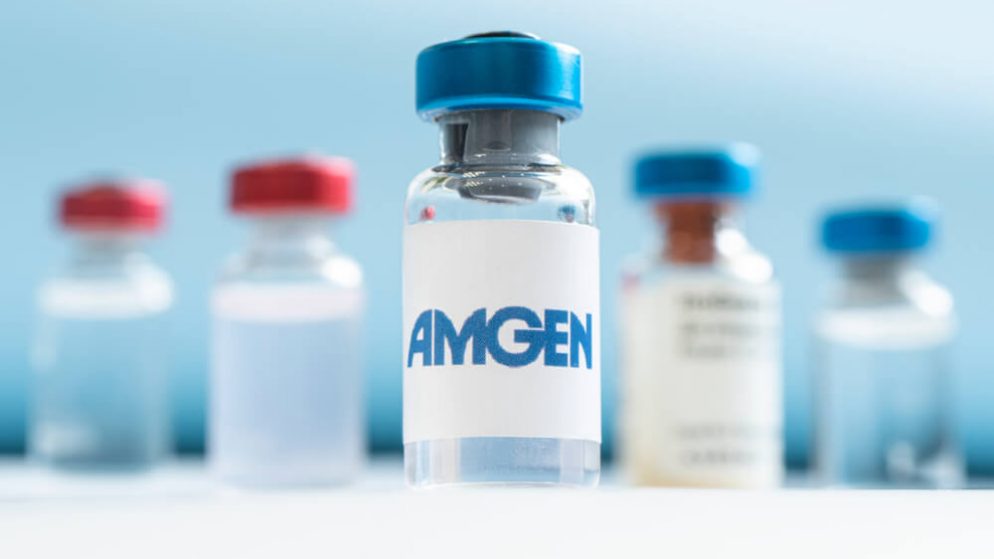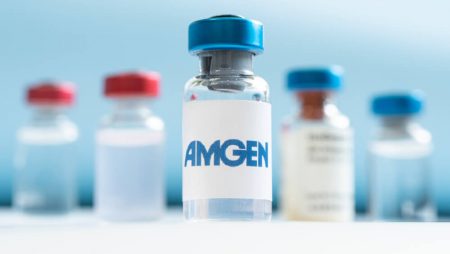



Get new exclusive access to healthcare business reports & breaking news




Another patent contest is brewing between Big Pharma giants Amgen and Johnson & Johnson (J&J). Amgen has set its sights on producing a biosimilar of J&J’s top-selling psoriasis drug, Stelara, which has been in the U.S. market since September 2009.
Last December, J&J’s unit Janssen filed a lawsuit against Amgen over Stelara’s biosimilar drug for ulcerative colitis and related conditions, citing infringement of the drugmaker’s two patents.
Amgen’s entry into the psoriasis market could be postponed further by patents J&J recently acquired after purchasing biosimilar manufacturer Momenta Pharmaceuticals.
Interestingly, Johnson & Johnson’s lawsuit may be perked up by patents that hadn’t been awarded when Stelara was approved by the FDA in 2009. In fact, the company had no role in the invention of these patents that could help hold off biosimilars to its ulcerative colitis drug.
Johnson & Johnson acquired the-then autoimmune disease biotech Momenta Pharmaceuticals in August 2020 in a $6.5 billion blockbuster deal. The acquisition was largely seen as a move to access Momenta’s Nipocalimab, a late-stage experimental drug for hard-to-treat, rare autoimmune diseases like myasthenia gravis.
However, besides this significant drug portfolio and pipeline, J&J was also interested in enhancing its manufacturing knowledge and intellectual property. Being in the biosimilar industry for several years, Momenta had amassed considerable knowledge and expertise in the field, which J&J found invaluable.
Momenta’s purchase proved a particularly strategic move that enabled Johnson & Johnson to tap into know-how and patents it didn’t have, marking a significant milestone for the company’s development and sustainability plan. This might come in especially handy when battling biosimilars that threaten its dominance in certain markets.
Johnson & Johnson is keen to assert its patents, which could thwart attempts by biosimilar companies, such as Amgen, from penetrating the market.
The Thousand Oaks, California-based biopharma rival stands to face these hurdles since J&J could utilize the patents it acquired from Momenta as a bargaining tool to delay and extend Amgen’s entry into the market until after Stelara’s patent expiration date, which is expected to be in September 2023.
J&J certainly enjoys plenty of leverage in this situation since Stelara rakes in $18 million daily for the New Brunswick, New Jersey-headquartered company each day that remains exclusive in the U.S. market. Last year, the sales for the juvenile psoriatic arthritis drug jumped by 6.5% to $9.7 billion, accounting for more than 10% of the company’s global pharmaceutical sales in fiscal 2022.
The outcome of the patent assertion will undoubtedly have vast implications for the biopharmaceutical industry and dictate how Big Pharma will approach intellectual property protection in the future.
According to an avid critic of the American patent system Tahir Amin, the situation illustrates the various tactics used to delay Amgen’s entry into the market. Initiative for Medicines, Access, & Knowledge’s co-founder believes that some Big Pharma players leverage the legal framework to their advantage, curtailing competition and limiting patients’ access to new and potentially life-saving therapies.
On their end, executives at Johnson & Johnson have already given investors a heads-up that Stelara may face stiff biosimilar competition in 2023, but the company suggests that its market exclusivity could last longer.
During the J.P. Morgan Healthcare Conference held in January, J&J’s CFO Joe Wolk stated that no FDA-approved biosimilar has yet to be green-lighted for the market.
The situation exemplifies how Big Pharma uses intellectual property laws to secure their drugs’ market position, a practice that amounts to patent thickets.
The practice is widespread, especially among biologic pharmaceuticals whose unique composition and manufacturing processes present more patent opportunities than conventional chemical drugs.
However, in its recently published annual report, the company noted that Stelara’s last ‘composition of matter’ patent is slated for expiry in September 2023. This special patent safeguards the underlying pharmaceutical, making it bulletproof to most lawsuits.
The legal battle between Johnson & Johnson and Amgen ensued when the latter announced plans to market a biosimilar variant of Stelara, one of J&J’s top-earning drugs. This initiated the so-called ‘patent dance’ – a legal process established under a 2009 law to regulate the approval of biosimilars.
The ‘patent dance’ requires the two parties to exchange sensitive information and work through any intellectual property issues that are found.
The legal challenge escalated in November 2022 when J&J responded to Amgen’s notification and filed a court complaint, citing a couple of patents, both of which the pharmaceutical company invented.
However, J&J later updated its claim by adding Momenta’s four other patents initially filed between 2012 and 2015. The company filed a preliminary injunction in March, citing two of those Momenta Pharmaceuticals patents.
The two patents in question relate to the modification of animal cell cultures, which are vital in the development of monoclonal antibodies – a group of biopharmaceuticals that include J&J’s Stelara.
The patented process also involves calibrating these large proteins’ amino acid and carbohydrate connections, optimizing control of the structure and efficacy of these antibody-based biologic drugs.
Momenta previously developed this process while working on Eylea, Humira, and other antibody-based biologics before changing their focus away from biosimilar drug development.
J&J now alleges that Amgen infringes on these patents with its Stelara biosimilar, identified as ABP 654, which is the reason for the ongoing legal feud.
J&J’s reliance on patents issued to Momenta long after the FDA approved Stelara is a typical legal tactic in bio-pharmaceutical industry litigation —one that some critics argue restricts competition and raises costs for healthcare services.
Despite criticism, the process could be beneficial in advancing innovations in drug manufacturing, according to Kevin Noonan, a patent attorney with the law firm McDonnell Boehnen Hulbert & Berghoff.
Innovations in biologics manufacturing, such as enhanced drug efficacy and optimized biomanufacturing processes, can lengthen a product’s market position.
Such patents could extend a product’s market exclusivity and limit market competition. Some view this strategy as monopolizing the market and stifling competition, but the law does not necessarily prohibit such practices.
In an official statement, a spokesperson for J&J noted that the company has consistently advocated for a competitive biopharmaceutical industry that promotes biosimilar innovation. The company is confident in its intellectual property claim for Stelara and affiliated manufacturing patents.
The spokesperson assured stakeholders that J&J would vigorously defend its intellectual property claim using every legal resource available if challenged.
J&J’s archrival AbbVie received similar criticism after it defended Humira, its top-grossing drug used to treat inflammatory diseases, against a biosimilar launched by Amgen in January. Most critics alleged that AbbVie was using the litigation in a bid to monopolize the inflammatory disease drug market.
The criticism persisted even years after Humira’s primary patents expired in 2016. AbbVie managed to forestall competition from biosimilar makers due to secondary patents it secured, enabling them to negotiate phased market entry while maintaining its market position.
Like AbbVie, J&J could negotiate an entry phase with biosimilar makers, although such agreements could attract scrutiny from regulators like the Federal Trade Commission.
In response to these concerns, the Senate Judiciary Committee introduced a bill that seeks to restrict some of the legal measures originator drug companies can take. For instance, the proposal would limit the number of patents that an originator pharma company could claim for inactive manufacturing processes or intellectual properties patented more than 4 years after the associated drugs have been approved.
Although the Senate Judiciary Committee passed a similar bill in 2022, it failed to receive a vote in Congress houses.